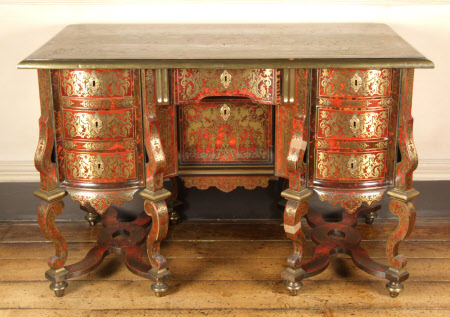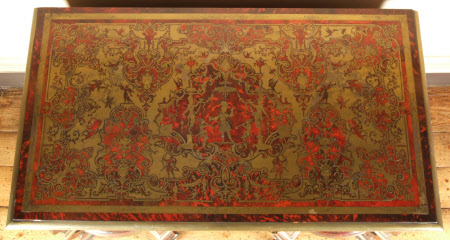Writing table
Category
Furniture
Date
circa 1705
Materials
Oak and pine carcass, walnut drawers, veneered with walnut, tortoiseshell and brass inlay
Measurements
76 x 119 x 66 cm
Place of origin
Paris
Order this imageCollection
Petworth House and Park, West Sussex
NT 485368
Summary
A French kneehole desk also known as "bureau Mazarin", circa 1705-1710, possibly by Nicolas Sageot (1666-1731), veneered with "en première partie" marquetry of brass and red tortoiseshell, inlaid with arabesques and figures, the top centred by an unusual scene depicting a dancer and monkey musicians, opening with a central drawer above a cupboard door, flanked to each side by three drawers, on eight scrolling legs joined by a x-stretchers.The present piece is very similar to a desk stamped by Nicolas Sageot in the Royal Collection, Stockholm. Another comparable example of identical form with shaped aprons and nearly identical marquetry except for the top, also attributed to Nicolas Sageot, is in the Ermitage Museum, St Petersburg (from the Roudanovski collection). It was most probably acquired by the 2nd Earl of Egremont (1710-1763) in the 1750s as listed for the first time in the 1763 Petworth House inventory with another writing desk inlaid with red tortoiseshell and pewter on brass (NT 485372):" Rich brass and tortoiseshell inlaid commode" and "brass enlaid commode-table". Both were placed in bedrooms, possibly used as dressing tables. In 1752 the 2nd Earl bought a "French commode" at Prestage's auction rooms.
Provenance
Purchased by the 2nd Earl of Egremont (1710-1763) in the 1750s. Recorded in the 1763 Petworth House inventory. By descent, until the death in 1952 of the 3rd Lord Leconfield, who had given Petworth to the National Trust in 1947, and whose nephew and heir, John Wyndham, 6th Lord Leconfield and 1st Lord Egremont (1920-72) arranged for the acceptance of the major portion of the collections at Petworth in lieu of death duties (the first ever such arrangement) in 1956 by H.M.Treasury.
Marks and inscriptions
General/ Fine Art Manufacturer/ and/ Renovator of Old Works/86 Charlotte Street/Fitzroy Square, W (paper label on underside)
References
Hughes, 2008: Peter Hughes. “French furniture at Petworth: Boulle and the acquisitions from Hamilton Palace in 1882.” Apollo, suppl. Historic Houses and Collections Annual April (2008): pp.58-66. Rowell 2012 : Christopher Rowell, Petworth, The People and the Place, Scala, 2012 Jackson-Stops, 1977: Gervase Jackson-Stops. “The furniture at Petworth.” Apollo 105.183 (1977): pp.358-66. Ronfort 2009: Jean Nérée Ronfort (ed.), André Charles Boulle, 1642-1732 : Un nouveau style pour l’Europe (ex. cat.), Frankfurt 2009, p.170

